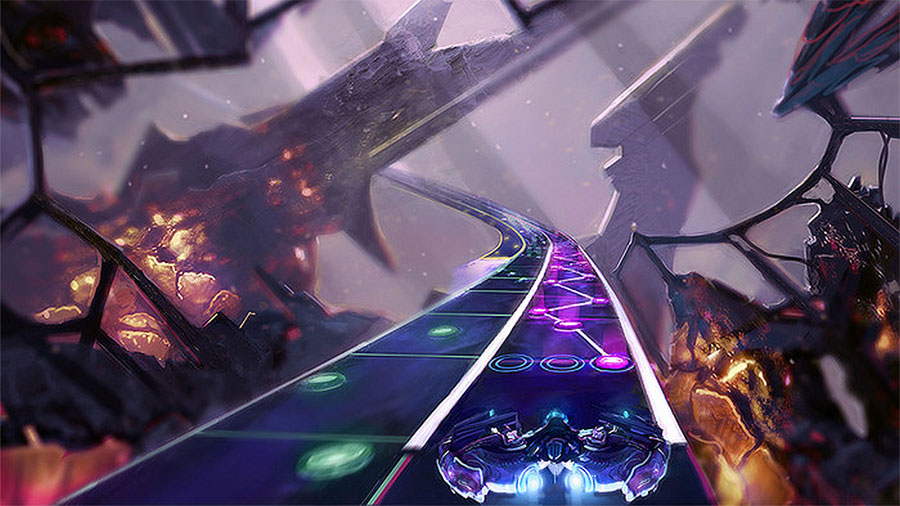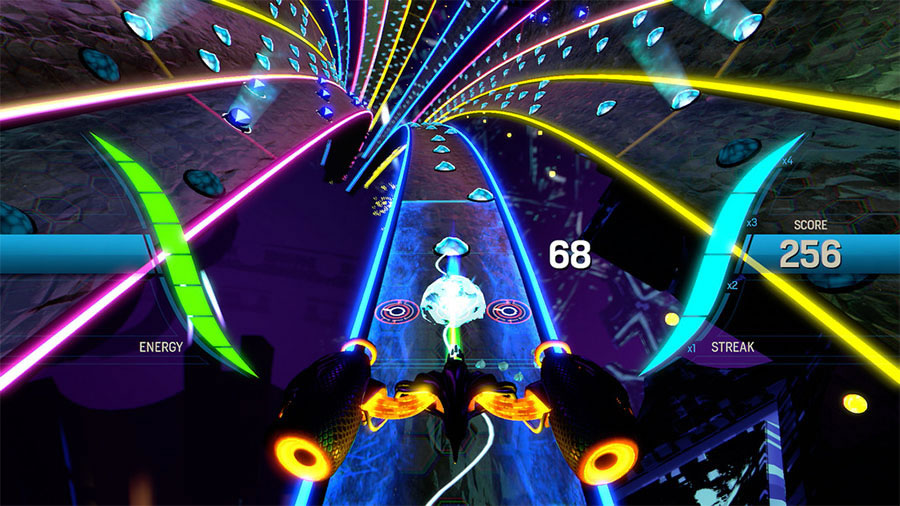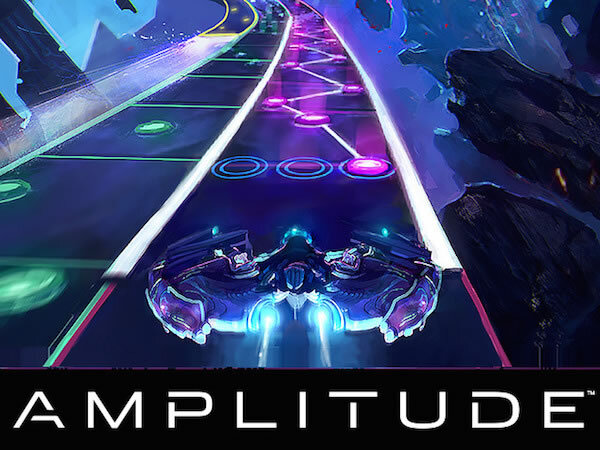- CLASSIC MAGAZINES
- REVIEW CREW
A show recapping what critics thought back
when classic games first came out! - NEXT GENERATION'S BEST & WORST
From the worst 1-star reviews to the best
5-stars can offer, this is Next Generation! - NINTENDO POWER (ARCHIVE)
Experience a variety of shows looking at the
often baffling history of Nintendo Power! - MAGAZINE RETROSPECTIVE
We're looking at the absolutely true history of
some of the most iconic game magazines ever! - SUPER PLAY'S TOP 600
The longest and most ambitious Super NES
countdown on the internet! - THEY SAID WHAT?
Debunking predictions and gossip found
in classic video game magazines! - NEXT GENERATION UNCOVERED
Cyril is back in this spin-off series, featuring the
cover critic review the art of Next Generation! - HARDCORE GAMER MAGAZING (PDF ISSUES)
Download all 36 issues of Hardcore Gamer
Magazine and relive the fun in PDF form!
- REVIEW CREW
- ELECTRONIC GAMING MONTHLY
- ELECTRONIC GAMING MONTHLY RANKS
From Mario to Sonic to Street Fighter, EGM
ranks classic game franchises and consoles! - ELECTRONIC GAMING MONTHLY BEST & WORST
Counting down EGM’s best and worst reviews
going year by year, from 1989 – 2009! - ELECTRONIC GAMING BEST & WORST AWARDS
11-part video series chronicling the ups and
downs of EGM’s Best & Worst Awards!
- ELECTRONIC GAMING MONTHLY RANKS
- GAME HISTORY
- GAME OVER: STORY BREAKDOWNS
Long-running series breaking down game
stories and analyzing their endings! - A BRIEF HISTORY OF GAMING w/ [NAME HERE]
Real history presented in a fun and pithy
format from a variety of game historians! - THE BLACK SHEEP
A series looking back at the black sheep
entries in popular game franchises! - INSTANT EXPERT
Everything you could possibly want to know
about a wide variety of gaming topics! - FREEZE FRAME
When something familiar happens in the games
industry, we're there to take a picture! - I'VE GOT YOUR NUMBER
Learn real video game history through a series
of number-themed episodes, starting at zero! - GREAT MOMENTS IN BAD ACTING
A joyous celebration of some of gaming's
absolute worst voice acting!
- GAME OVER: STORY BREAKDOWNS
- POPULAR SHOWS
- DG NEWS w/ LORNE RISELEY
Newsman Lorne Riseley hosts a regular
series looking at the hottest gaming news! - REVIEW REWIND
Cyril replays a game he reviewed 10+ years
ago to see if he got it right or wrong! - ON-RUNNING FEUDS
Defunct Games' longest-running show, with
editorials, observations and other fun oddities! - DEFUNCT GAMES QUIZ (ARCHIVE)
From online quizzes to game shows, we're
putting your video game knowledge to the test!- QUIZ: ONLINE PASS
Take a weekly quiz to see how well you know
the news and current gaming events! - QUIZ: KNOW THE GAME
One-on-one quiz show where contestants
find out if they actually know classic games! - QUIZ: THE LEADERBOARD
Can you guess the game based on the classic
review? Find out with The Leaderboard!
- QUIZ: ONLINE PASS
- DEFUNCT GAMES VS.
Cyril and the Defunct Games staff isn't afraid
to choose their favorite games and more! - CYRIL READS WORLDS OF POWER
Defunct Games recreates classic game
novelizations through the audio book format!
- DG NEWS w/ LORNE RISELEY
- COMEDY
- GAME EXPECTANCY
How long will your favorite hero live? We crunch
the numbers in this series about dying! - VIDEO GAME ADVICE
Famous game characters answer real personal
advice questions with a humorous slant! - FAKE GAMES: GUERILLA SCRAPBOOK
A long-running series about fake games and
the people who love them (covers included)! - WORST GAME EVER
A contest that attempts to create the worst
video game ever made, complete with covers! - LEVEL 1 STORIES
Literature based on the first stages of some
of your favorite classic video games! - THE COVER CRITIC
One of Defunct Games' earliest shows, Cover
Critic digs up some of the worst box art ever! - COMMERCIAL BREAK
Take a trip through some of the best and
worst video game advertisements of all time! - COMIC BOOK MODS
You've never seen comics like this before.
A curious mix of rewritten video game comics!
- GAME EXPECTANCY
- SERIES ARCHIVE
- NINTENDO SWITCH ONLINE ARCHIVE
A regularly-updated list of every Nintendo
Switch Online release, plus links to review! - PLAYSTATION PLUS CLASSIC ARCHIVE
A comprehensive list of every PlayStation
Plus classic release, including links! - RETRO-BIT PUBLISHING ARCHIVE
A regularly-updated list of every Retro-Bit
game released! - REVIEW MARATHONS w/ ADAM WALLACE
Join critic Adam Wallace as he takes us on a
classic review marathon with different themes!- DEFUNCT GAMES GOLF CLUB
Adam Wallace takes to the links to slice his way
through 72 classic golf game reviews! - 007 IN PIXELS
Adam Wallace takes on the world's greatest spy
as he reviews 15 weeks of James Bond games! - A SALUTE TO VAMPIRES
Adam Wallace is sinking his teeth into a series
covering Castlevania, BloodRayne and more! - CAPCOM'S CURSE
Adam Wallace is celebrating 13 days of Halloween
with a line-up of Capcom's scariest games! - THE FALL OF SUPERMAN
Adam Wallace is a man of steel for playing
some of the absolute worst Superman games! - THE 31 GAMES OF HALLOWEEN
Adam Wallace spends every day of October afraid
as he reviews some of the scariest games ever! - 12 WEEKS OF STAR TREK
Adam Wallace boldly goes where no critic has
gone before in this Star Trek marathon!
- DEFUNCT GAMES GOLF CLUB
- DAYS OF CHRISTMAS (ARCHIVE)
Annual holiday series with themed-episodes
that date all the way back to 2001!- 2015: 30 Ridiculous Retro Rumors
- 2014: 29 Magazines of Christmas
- 2013: 29 Questionable Power-Ups of Christmas
- 2012: 34 Theme Songs of Christmas
- 2011: 32 Game Endings of Christmas
- 2010: 31 Bonus Levels of Christmas
- 2009: 30 Genres of Christmas
- 2008: 29 Controls of Christmas
- 2007: 34 Cliches of Christmas
- 2006: 33 Consoles of Christmas
- 2005: 32 Articles of Christmas
- 2004: 31 Websites of Christmas
- 2003: 29 Issues of Christmas
- 2002: 28 Years of Christmas
- 2001: 33 Days of Christmas
- NINTENDO SWITCH ONLINE ARCHIVE
- REVIEW ARCHIVE
- FULL ARCHIVE
Amplitude
Long before Rock Band and Guitar Hero, there was Frequency. Developed by indie darling Harmonix, this futuristic-themed rhythm game was part of Sony's brief foray in the music genre; an effort that had previously turned up quirky hits like PaRappa the Rapper, Um Jammer Lammy and Vib-Ribbon. But Frequency was different; it was fast-paced and filled with music from well-known American bands. It also marked a turning point where the rhythm genre began to feel more interactive.
While not a massive hit, Frequency led way to Amplitude, a 2003 sequel that expanded on the theme and included an even more impressive collection of top 40 bands. Although different in approach, you can see the building blocks of Guitar Hero and Rock Band in Amplitude. And while most of the die-hard fans ended up trading their FreQs for fake plastic guitars, many of us worried that we would never see Amplitude again.
Proving once again that you should never lose hope, the internet came together to fund the long-overdue Amplitude reboot. And after a 12 year hiatus, the original Harmonix series is back to former glory. Unfortunately, the well-known top 40 artists didn't make the trip to PlayStation 4.
While certainly similar to Rock Band, Amplitude plays by its own set of rules. Instead of playing one instrument, your job is to recreate all of the elements of the song. You do this by jumping from one lane to the next hitting the musical gems that bring life to the song. Once you've cleared one section, that lane will disappear and you'll move on to the drums, vocals, guitar or what have you.
As simple as it sounds, the tricky part comes when you try to juggle each of the lanes without letting them slip. You can't just ride the drum beat the whole song, the game will force you to make a quick transition to one of the other lanes. It's easy when these sections are right next to each other, but it won't take long until you're jumping two or three lanes over. Miss a transition and you'll lose some health and drop the multiplier.
 Click For the Full Picture Archive
Click For the Full Picture ArchiveThe music tilts heavily in favor of electronica and techno remixes. There are no rockin' guitar solos here, just heavy beats and lots of sound effects. The soundtrack is a world away from what we saw in Rock Band 4, and it's nice to see other genres of music represented in Harmonix games. That said, I have a hunch the choices will be a lot more divisive than the original PlayStation 2 game.
It doesn't help that the soundtrack is largely made up of musicians working at Harmonix. There are a few niche bands that have found success in the nerdcore movement, but it's nothing like the 2003 game. There's no Weezer or Blink-182 here, just Freezepop and Wolfgun. For what it is, the music perfectly fits the game and I like most of it, but I would be lying if I said I wasn't disappointed there weren't remixes of familiar songs.
For what is a fairly barebones package, I do appreciate the effort that went into creating a simple story mode. The fifteen stage campaign plays out like a concept album, complete with a story connecting everything together. It all involves doctors experimenting with a patient and trying to fix different parts of the brain. There's not much to it, but it does help introduce the different power-ups and even includes a couple new obstacles to overcome.
 Click For the Full Picture Archive
Click For the Full Picture ArchiveThe power-ups will look familiar to anybody who played the original game. By hitting the right series of notes, players will gain the ability to slow down the action, add a second multiplier and even destroy a lane without hitting a single note. There's also a freestyle power-up that sends you high above the note highway and sees players scribble in the sky. Knowing when to use these items can be the difference between life and death, especially on the higher difficulties.
Outside of the story mode, most of the action happens in the Quick Play area. Here you'll be able to compare scores and work towards unlocking the rest of the music. Even after you've completed the campaign, there are still a number of songs to unlock through grinding. There's no trick to it, just good old fashioned playing songs over and over. While you'll most likely want to play the songs a bunch, I found getting the last few tracks to be a real chore.
Part of the problem is that there simply isn't much to do. It won't take long to play through the 31 songs and you can only improve your score so much. It doesn't help the backgrounds begin to blur together after a while and only a few of the songs really stand out. The game does support four-person multiplayer, but it's not as compelling as what you get in Rock Band. It's also not online, which was a big selling point of the 2003 original.
Even if I'm underwhelmed by the soundtrack and structure, I'm happy to have Amplitude back. The gameplay remains just as exciting as I remember it, especially on the higher difficulties. But I can't help but feel like some of its novelty has been replaced by deeper rhythm games. While I enjoyed my trip down the note highway, I'm not sure how often I'll come back.
HOME |
CONTACT |
NOW HIRING |
WHAT IS DEFUNCT GAMES? |
NINTENDO SWITCH ONLINE |
RETRO-BIT PUBLISHING
Retro-Bit |
Switch Planet |
The Halcyon Show |
Same Name, Different Game |
Dragnix |
Press the Buttons
Game Zone Online | Hardcore Gamer | The Dreamcast Junkyard | Video Game Blogger
Dr Strife | Games For Lunch | Mondo Cool Cast | Boxed Pixels | Sega CD Universe | Gaming Trend
Game Zone Online | Hardcore Gamer | The Dreamcast Junkyard | Video Game Blogger
Dr Strife | Games For Lunch | Mondo Cool Cast | Boxed Pixels | Sega CD Universe | Gaming Trend
Copyright © 2001-2024 Defunct Games
All rights reserved. All trademarks are properties of their respective owners.
All rights reserved. All trademarks are properties of their respective owners.






























